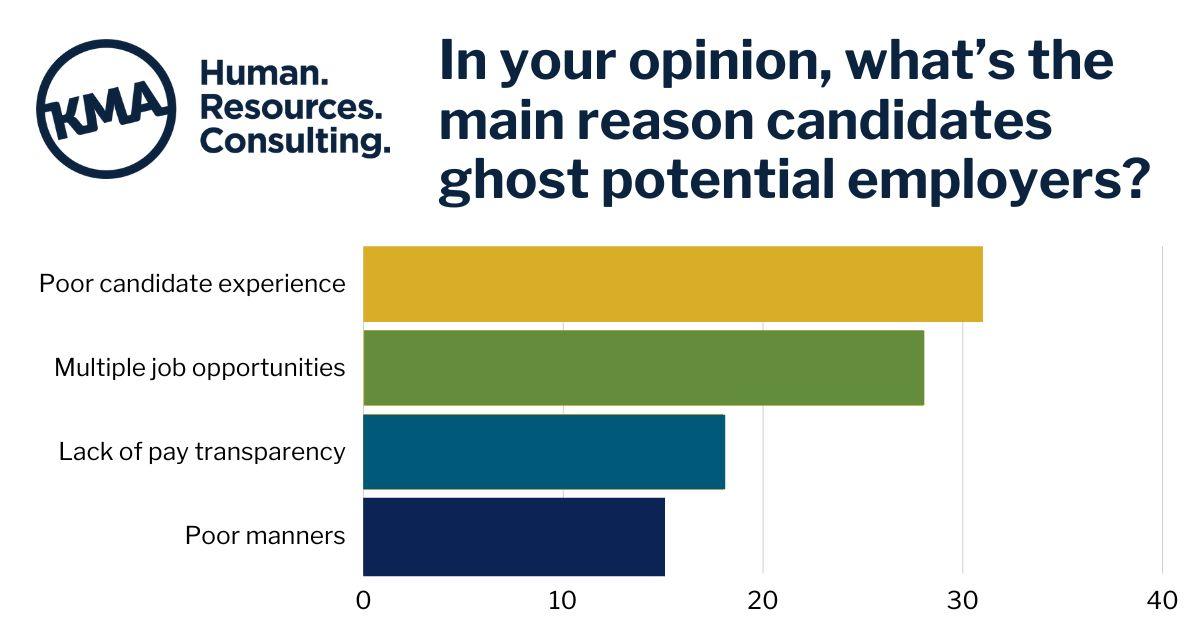
October 2, 2023
Hello!
This month, we’re taking a look at a spooky trend we’ve noticed has been on the rise lately: ghosting. We’re not talking about dating. In this context, we’re talking about ignoring a potential employee – or employer – at any point during the recruiting process.
Almost everyone you ask will have a horror story of applying to jobs only to hear…nothing. Not even a form email confirming receipt of resume. We conducted a LinkedIn poll recently to see how common this practice is, and 96% of respondents reported that they had been ghosted by a potential employer. A truly shocking 67% were ghosted after an interview had taken place, and 4% reported being ghosted after receiving a job offer. Commenters on the poll expressed how unprofessional the practice is, and what a sad statement it makes on the current recruitment environment.

We know this happens because of poor candidate management, and – let’s face it – poor manners. Keep in mind, it can also happen through technical or human error. Maybe an email didn’t come through a firewall, or maybe the lack of follow up was unintentional. However, the further along in the process, the more inexcusable it is for a recruiter to drop the ball on an applicant.
At KMA, our recruiting team is strongly pro-communication, and is committed to keeping both candidates and clients informed throughout the entire hiring process. It’s not just the right thing to do, it’s smart from a business perspective. It can seriously damage your brand if people who are interested in working at your company are treated disrespectfully when applying. Consider too that a candidate might have been encouraged to apply by a current or former employee, or by a trusted partner or other associate. The negative experience can spread like wildfire among some of your best brand ambassadors – and make future hiring even tougher.
Here are five best practices from our recruiting team on how to thoughtfully and expertly manage the candidate experience.
- Treat every applicant professionally and in a way that respects their time and interest in your company.
- Ensure the process reflects your company’s values.
- Communicate to candidates at every step along the way: application received; interview requested; regular status updates; final hiring decision made.
- When a decision is made not to pursue a candidate, communicate this immediately, express appreciation for their interest in your company, and encourage them to apply again in the future, if appropriate.
- When reaching out to a candidate who made it through to the interview stage, it’s our practice at KMA to communicate that they were not selected by phone call rather than email. This personal touch is always appreciated, shows respect, and leaves a more positive impression of the experience, and company brand, for the candidate.
We know that the ghosting phenomenon is happening on both sides of the interview desk, and many candidates are also guilty of abruptly ceasing communication in the midst of a recruiting process. For all the same reasons it’s wrong on the employer side, job seekers should understand that they can hurt their professional reputations by this type of behavior – and it’s never good to burn bridges.
As a candidate, if you’re no longer interested in a job you’ve applied for, we recommend communicating immediately that you are withdrawing your application. It helps the hiring manager streamline their process and swiftly move on to candidates who are interested.
A separate LinkedIn poll we conducted in August asked about the reasons candidates ghost potential employers, and the number one response was poor candidate experience, with a close second being multiple job opportunities. In the recruiting relationship, both sides will have a lot going on that, for obvious reasons, they cannot share with the other party. A simple rule of thumb is to treat others the way you would like to be treated if you were in their position.

If you’re a job seeker, or if you’re open to a career change, check out the KMA Career Center, offering resources, tips, and access to open jobs we’re actively hiring for.
If you have any recruiting ghost stories you’d like to share with me, please reply. If you need to hire new employees – or if you plan to hire in the near future – reach out to us at KMA, and be confident that the process will be handled with care, professionalism and that all-important personal touch, resulting in an excellent hire for you, and a positive experience for all!

Cheers,
Kim Anania
President and CEO
KMA Human Resources Consulting
 After 9 years as KMA’s Business Development Director, Debby Olken is set to leave her role at KMA this month. We are so appreciative of Debby’s foundational contributions to KMA’s success and growth over her tenure. We will miss Debby’s energy, dedication and loyalty to KMA, and wish her all the best in her next chapter.
After 9 years as KMA’s Business Development Director, Debby Olken is set to leave her role at KMA this month. We are so appreciative of Debby’s foundational contributions to KMA’s success and growth over her tenure. We will miss Debby’s energy, dedication and loyalty to KMA, and wish her all the best in her next chapter.
Join us for our webinar on October 19th

We’re excited to announce our webinar collaboration with attorney Francesco (Fran) DeLuca, of Epstein Becker Green. In this session, Rachel Flynn, HR Services Manager, Compliance at KMA, will sit down with Fran to clarify some of the more confounding aspects of the ADA’s reasonable accommodation requirements, including how the ADA intersects with other laws, like the Family and Medical Leave Act, the Pregnant Workers Fairness Act, and the PUMP Act.
This program is valid for 1 PDC for the SHRM-CP® or SHRM-SCP®
Learn more and register here.
Navigating the Future of Work: Ten Considerations for Managing a Remote/Hybrid Workforce
by Rhoda McVeigh
 It’s a good bet that remote and hybrid work arrangements will continue to be a factor in the workplace for the foreseeable future. Employees are demanding it, and successful organizations will need to invest in making these models productive in order to attract and retain top talent, and be in the best position to meet overall business goals.
It’s a good bet that remote and hybrid work arrangements will continue to be a factor in the workplace for the foreseeable future. Employees are demanding it, and successful organizations will need to invest in making these models productive in order to attract and retain top talent, and be in the best position to meet overall business goals.
Read the full article.
Seven Tips for Effective Meetings
by the pros at the HR Support Center
 If you want to get a snapshot of your organization’s effectiveness, look at your meetings. Are they efficient and productive? Do their results justify the time and expense? Are meetings an occasion for collaboration, knowledge sharing, and getting things done? Or are they a waste of time and cause of needless frustration?
If you want to get a snapshot of your organization’s effectiveness, look at your meetings. Are they efficient and productive? Do their results justify the time and expense? Are meetings an occasion for collaboration, knowledge sharing, and getting things done? Or are they a waste of time and cause of needless frustration?
Read the full article.
Maine’s New Captive Audience Meeting Law: What Employers Need to Know
Maine’s “An Act to Protect Employee Freedom of Speech” (also known as a captive audience meeting law) went into effect September 19, 2023. Here’s what Maine employers need to know.
You can subscribe right here and receive these content-rich HR updates directly in your inbox!

